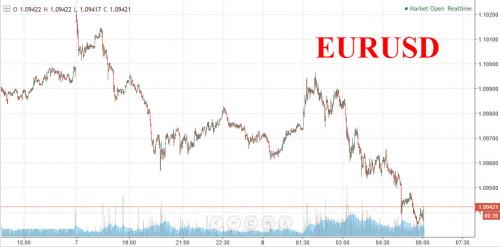It was supposed to be Risk Macr-ON after Emmanuel Macron’s avalanche victory in Sunday’s French presidential elections; instead as some banks cautioned and as we showed early in the overnight session, the market reaction has been the opposite with the victory fully priced in (and more) and especially in the European currencies and stocks, as well as S&P futures, we have seen a modest episode of Risk Macr-Off. Treasury yields are falling 1-1.5bps in flattening fashion with the 10y at 2.33%. WTI crude oil has largely traded sideways and was modestly lower in early morning trade despite another monster jawboning session from the Saudi energy minister as well as Russia, both signaling they could extend production cuts into 2018, indicating that what little credibility OPEC may have had is virtually gone.
After climbing for five of the past six days in the buildup to the election of Emmanuel Macron, overnight the euro succumbed to “selling the news” and after climbing above the “psychological” 1.10 level after Macron’s victory investors booked profits. While the common currency rose to $1.1023 during early Asia trading, further filling the gap following the U.S. elections in November, with that move taking it more than 2.7% higher since the first round of the French elections, subsequent fast-money names unwound part of their longs. That saw the currency fall as much as 0.6 percent to $1.0936 in the European morning.

Â

Discussing the Euro move, SocGen’s Kit Juckes said that “the Euro went up a bit, down a bit and ended pretty much where it was last week. It faces two short-term challenges. The first is that the FX market has moved a good way further in recent days than the bond market, with the Treasury/Yield spread not very different from where it was when EUR/USSD was under 1.08. Bunds need to catch up with the currency. The second hurdle is positioning. CFTC data show the smallest speculative Euro short in 3 years. That’s still a short position, of course, so much more of a short-term hurdle than a reason for a deep correction to lighten positions. A period of choppy trading is likely for now.”

While the Euro’s reaction was perhaps predictable, Macron’s decisive triumph over Marine Le Pen will strengthen the EU, according to Bloomberg,
and deal a blow to the populist wave that has roiled western democracies for the past year. But the scope for a relief rally was limited after market gains in the buildup to Sunday’s vote. Global stocks are trading at the highest ever, and U.S. equities also closed at a record last week after better-than-forecast data on American jobs.

The unwind in the Euro prompted concerns about broader risk assets, and as a result the initial kneejerk reaction in European stocks and US equity futures, has faded entirely and while Asian stocks rose, European equities and S&P futures fell with investors having more than fully priced the result in.
With the political risks that have dominated European markets in a year packed with elections seen receding, the European Central Bank is expected to have more room to tighten policy as the euro zone economic recovery gathers pace. Poor Chinese trade data released overnight hurt risk sentiment.
Following a strong start in Asia, European equities began on the front-foot, before slipping into negative territory in a ‘buy the rumour, sell the fact’ fashion with the CAC 40 trading lower by 0.5%. In terms of broader performance across the continent, material names underpefrom in the wake of disappointing Chinese trade data which saw imports and exports fall short of expectations (Copper imports -Â Â 22.9% Y/Y).
- Exports (CNY)(Apr) 14.3% vs. Exp. 16.8% (Prey. 22.3%)
- Imports (CNY)(Apr) 18.60% vs. Exp. 29.30% (Prey. 26.30%)
- Exports (USD)(Apr) Y/Y 8.00% vs. Exp. 10.40% (Prey. 16.40%)
- Imports (Apr) Y/Y 11.9% vs. Exp. 18.0% (Prey. 20.3%)

“Investors will now go back to the basics of watching the underlying euro zone economic and inflation data and what implications it may have for monetary policy,” said Iain Stealey, a fixed income portfolio manager for JPMorgan Asset Management.
Eslewhere, the dollar strengthened, Treasuries held steady and futures for U.S. stocks pointed lower. Oil swung as the Saudi oil minister said OPEC’s supply cuts will be extended into the second half of the year and possibly beyond. Energy names have been lifted by further OPEC and non-OPEC jaw-boning as Russian and Saudi rhetoric has revealed a desire to extend output cuts beyond 2017 if needed, even as China’s oil imports dropped from a record as independent refiners slow buying and both WTI and Brent trading modestly lower at publication time.
Looking at global equity markets, Japan’s Topix soared 2.3% to the highest since December 2015 as investors played catch-up after a three-day holiday. South Korea’s Kospi jumped 2.3% to a fresh record ahead of Tuesday’s election. Meanwhile, the selloff in China continued, with the Shanghai Composite Index dropping 0.8% to the lowest level since October, despite data showing overseas shipments held up in April.The Stoxx Europe 600 slipped 0.2 percent in London, dragged down by miners. Futures on the S&P 500 were down 0.2% .
The yield on 10-year Treasury notes was flat at 2.35 percent. French benchmark yields fell two basis points to 0.82 percent.
Oil prices, which hit almost six-month lows last week on worries about a global glut of crude, edged up on prospects of output cuts agreed by the OPEC producers group and others could be extended. Brent futures rose 38 cents to $49.48 a barrel.
Gold rose 0.3 percent to $1,231 an ounce. Copper prices fell 1.4 percent to four-month lows around $5,015 a tonne as Chinese trade data showed April imports of the metal dived 30 percent from a month earlier.

